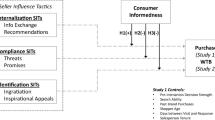Abstract
Given their limited financial resources, shoppers generally appreciate the practical necessities of resisting sales pitches and other promotional activities destined to entice them into inopportune purchases. At the same time, ventures into the marketplace represent practical necessities for nearly everyone as well as significant forms of entertainment (Prus and Dawson, 1991; Prus, 1993) for a great many people. This generates a series of interactional dilemmas for almost everyone in western society as they attempt to pursue their interests in conjunction with the salespeople they encounter. Building on data from a larger study of consumer practices, this paper considers the ways in which buyers attempt to maintain control over the lines of action they develop in potential purchasing contexts. In particular, attention is given to the ways in which people manage intimacy and distancing in shopping contexts by focusing on (a) people’s preferences for self-serve versus service settings and (b) shoppers anticipations as targets of the influence process.
Similar content being viewed by others
References
Belk, R. W. (1988). Possessions and the Extended Self.Journal of Consumer Research 15: 139–168.
Blumer, H. (1969).Symbolic Interactionism. Berkeley, Cal.: University of California Press (1987).
Davis, F. (1959). The Cab Driver and His Fare.American Journal of Sociology 65: 158–165.
Festinger, L. A. (1957).Theory of Cognitive Dissonance. Evanston, Illinois: Row, Peterson.
Goffman, E. (1956). The Nature of Deference and Demeanor.American Anthropologist 58: 473–502.
Lemert, E. (1953). An Isolation and Closure Theory of Naive Check Forgery.The Journal of Criminal Law, Criminology and Police Science 44: 296–307.
Mead, G. H. (1934).Mind, Self and Society. Chicago: University of Chicago Press.
Prus, R. (1976). Religious Recruitment and the Management of Dissonance: A Sociological Perspective.Sociological Inquiry 46(2): 127–134.
Prus, R. (1989a).Making Sales: Influence as Interpersonal Accomplishment. Newbury Park, Ca.: Sage.
Prus, R. (1989b).Pursuing Customers: An Ethnography of Marketing Activities. Newbury Park, Ca.: Sage.
Prus, R. (1991). Just Browsing Thanks: Focused and Diffuse Shopping Practices. Pp. 296–302 in Terry L. Childerset al., 1991 AMA Winter Educators’ Conference Proceedings. Volume 2. Chicago, Illinois: American Marketing Association.
Prus, R. (1993). Shopping with Companions: Images, Influences, and Interpersonal Dilemmas.Qualitative Sociology 16(2): 87–110.
Prus, R. (Forthcoming) Elusive Targets: Reluctant Involvements and Evasive Tactics on the Part of Shoppers (in progress).
Prus, R. and L. Dawson (1991). Shop til You Drop: Shopping as Recreational and Laborious Activity.Canadian Journal of Sociology 16: 145–164.
Prus, R. and W. Frisby (1990). Persuasion as Practical Accomplishment: Tactical Manoeuverings at Home (Party Plan) Shows.” Pp. 133–162 inCurrent Research on Occupations and Professions, Volume 5, edited by Helena Znaniecki Lopata. Greenwich, Conn.: Jai Press.
Simmel, G. (1907).The Philosophy of Money (translated by Tom Bottomore and David Frisby). Boston, Mass.: Routledge and Kegan Paul.
Simmel, G. (1950).The Sociology of Georg Simmel (Kurt Wolff, trans and ed.). New York: Free Press.
Author information
Authors and Affiliations
Rights and permissions
About this article
Cite this article
Prus, R. Consumers as targets: Autonomy, accountability, and anticipation of the influence process. Qual Sociol 17, 243–262 (1994). https://doi.org/10.1007/BF02422254
Issue Date:
DOI: https://doi.org/10.1007/BF02422254




